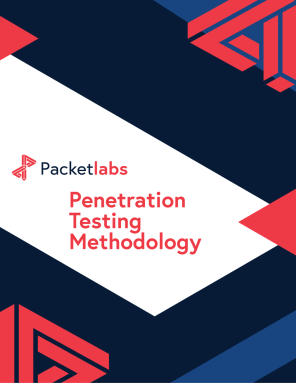Why Organizations Need More Than a VA Scan
Would you like to learn more?
Download our Pentest Sourcing Guide to learn everything you need to know to successfully plan, scope, and execute your penetration testing projects.
Think that, to buff your cybersecurity, you can get away with a simple VA scan?
Well, today's blog is your sign to rethink that.
Today, we outline what a VA scan is, what it can (and can't do!) for your organization, and what other options you should be keeping available.
Let's start:
What is a VA Scan?
A VA scan (also known as a "vulnerability scan", a "compliance audit", or a "security assessment") is an automated software that is designed to assess computer systems, networks and applications for weaknesses that make them vulnerable to cyber-attacks. The objective of using a VA scan is to identify vulnerabilities and weak configurations that an attacker may exploit.
Although VA scans are often marketed as the only security test your business needs, they are not designed to test the effectiveness of existing security controls against a skilled human attacker.
Instead, they utilize predetermined scripts and databases to check systems for out-of-date software, weak/default configurations, weak/default credentials, and if existing measures are working as intended. As a result, even a technically compliant organization could still be vulnerable.
What a VA Scan Can (and Can't) Do For Your Cybersecurity
While security audits like VA scans are an important part of maintaining your organization’s security, they are not in-depth enough on their own.
VA scans:
Only check for known vulnerabilities in known software
Cannot properly evaluate custom/in-house applications
Do not consider the nuances of your business
Are not applicable in real-world situations– results are only useful in the same context the test was conducted
Cannot adequately check for sensitive information leakage
Still require further evaluation and manual investigation of findings
With a cyberattack happening every 39 seconds, your organization needs the most comprehensive cybersecurity available. And that starts not with a VA scan, but with 95% manual penetration testing.
The Benefits of Penetration Testing vs. a VA Scan
Penetration testing can combine both manual and automated testing to reveal more vulnerabilities and potential points of attack than automated scanning alone. Unlike VA scans, penetration testing relies on the expertise of trained professionals to simulate attacks against computer systems to discover weaknesses – all in the name of cybersecurity.
Even well-resourced networks that utilize the latest attack prevention and detection technologies can be vulnerable to capable hackers, especially when armed with a lucrative motive. A penetration test is thorough by nature, allowing for multiple avenues of attack to be explored, not just the industry standard in a control environment. For most organizations, all weaknesses cannot be detected by a vulnerability scan alone, and most attackers don’t utilize a single exploit, but a combination of information and weaknesses from different points in various systems to compromise their targets.
The fundamental goal of penetration testing is to discover vulnerabilities in target systems or applications, map the attack surface area and try to put the pieces together to obtain access to sensitive information or control over a target. As such, an outside company should perform penetration testing so that your organization can benefit from an independent assessment and a set of eyes unfamiliar with the security details – mimicking a real-world scenario.
Types of Pentests
Here at Packetlabs, our team of ethical hackers offers four main types of pentesting solutions:
Infrastructure Penetration Testing, which uncovers vulnerabilities residing within your infrastructure and provides a detailed attack narrative to help evaluate the impacts of each finding
Ransomware Penetration Testing, which evaluates the preparedness and risk of a ransomware attack
Objective-Based Penetration Testing, which is a bundle that includes our thorough Infrastructure Penetration Testing service offering
And Cloud Penetration Testing, which uncovers vulnerabilities residing within your cloud infrastructure and provides a detailed attack narrative to help evaluate the impacts of each finding
Each of these is in addition to our wide range of adversary simulation, application security, and security assessment offerings.
Conclusion
There are many reasons why a business may want to conduct a penetration test. For some, penetration testing is an industry-standard. Others may want to protect their organization’s reputation, valuable information, intellectual property, customer and employee information, as well as critical infrastructure and equipment that may have safety implications.
In either case, businesses should be looking for consultants that think outside the box and who customize their approach to meet your specific business environment and goals. Reach out to our team today to learn what type of pentesting would best benefit you.
Contact Us
Speak with an Account Executive
Interested in Pentesting?

Penetration Testing Methodology
Our Penetration Security Testing methodology is derived from the SANS Pentest Methodology, the MITRE ATT&CK framework, and the NIST SP800-115 to uncover security gaps.
Download Methodology
Pentest Sourcing Guide
Download our Pentest Sourcing Guide to learn everything you need to know to successfully plan, scope, and execute your penetration testing projects.
Download GuideFeatured Posts

February 16 - Blog
The Rise of Hackers in APAC and Its Implications for Australia
While APAC is steadily emerging as a global innovation hub, the region's massive digitization post-pandemic has outpaced its cybersecurity preparedness and has led to a spike in breaches.

January 05 - Blog
2025 in Review: 2025 Cybersecurity Trends
What were the 2025 cybersecurity trends that have shaped 2026's security priorities? Learn more about the top security trends influencing cyber roadmaps around the globe.

January 02 - Blog
What the BlackCat Guilty Pleas Mean for Cybersecurity
Read more about what the BlackCat guilty pleas mean for cybersecurity, and how teams can fortify against advanced insider threats.







